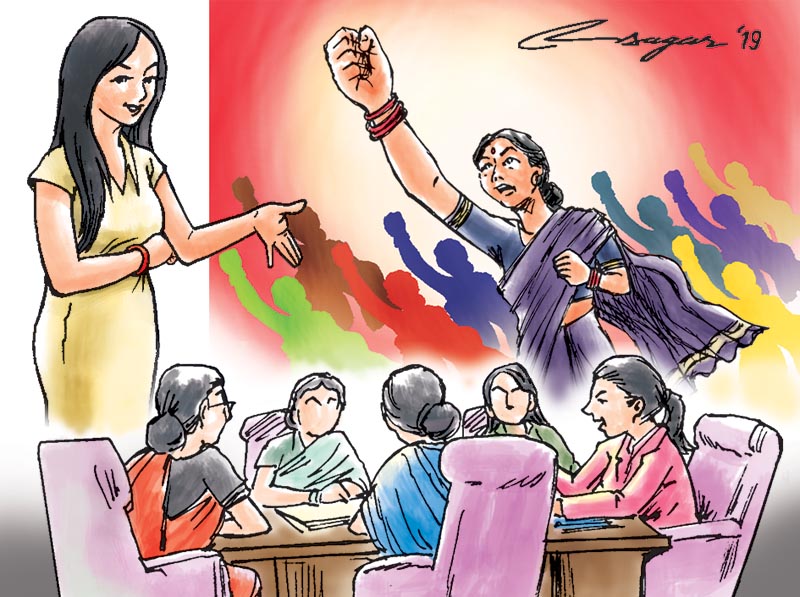She Decides Day: Speaking out for sexual rights
When we combine our voices and our strengths, and we stand together, we can help create a world where every girl and woman can decide what to do with her body, with her life and with her future
On March 1, representatives from governments, UN agencies and NGOs, both from the international arena and Nepal, will come together to celebrate SheDecides Day. Last year, the first global SheDecides Day took place in Pretoria, South Africa.
SheDecides is a movement that was sparked in response to the reinstatement and expansion of the Global Gag Rule by US President Donald Trump in 2017. That year, governments, UN agencies, donors and NGOs came together, united by a vision, that we would step up, stand up and speak up for women’s and girls’ rights to decide for themselves and make choices on critical life decisions: Who to love? Who to marry, when to marry or not to marry at all? Whether or not to have children, when to have children, how many children to have and how often?
Sexual and reproductive health and rights have been highly contested terrains from time immemorial. In many conservative societies, abortion is used as the ‘deal-breaker’ issue to deny women and girls a comprehensive range of sexual and reproductive health services. But the real target of conservative attack is the fundamental idea of sexual and reproductive autonomy, and to whittle down these fundamental freedoms to naught. These include access to contraceptive services, comprehensive sexuality education, respect and recognition of sexual and gender diversity, and setting aside of a sound public health practice, a rejection of evidence-based policymaking, and the denigration of scientific and medical expertise.
This phenomenon is apparent across countries in the region. The reverse is also true. Societies which recognise and respect sexual and reproductive rights of women and girls, in particular, the right to safe abortion, tend to affirm and fulfil rights to contraceptive services, comprehensive sexuality education and sexual and gender diversity.
ARROW has been working in the Asia-Pacific region for the last 26 years, and in that time Nepal has transformed itself into one of the few countries in the region truly committed to gender equality. Nepal has given the region and the globe an idea of how much can be accomplished in a short span of time in a less developed country, premised on citizen’s aspirations and political will.
In March 2002, Nepal legalised abortion under the 11th Amendment to the Civil Code. In 2007, the Supreme Court of Nepal ordered the government to legally recognise a third gender category, audit all laws to identify those that discriminated against LGBT people, and form a committee to study legal recognition of same-sex relationships.
In August 2017, Nepal passed a bill which served to modernise the age-old Muluki Ain (General Code) to suit the new realities of women, and to help end age-old practices rooted in discrimination against women. These include the practices of Chhaupadi, dowry and property rights. In October 2018, Nepal passed the Safe Motherhood and the Reproductive Health Rights Act. All of these critical legal changes testify to Nepal’s commitment to the agency and autonomy of girls and women.
While legal changes are to be lauded, and the laws provide the framework for change to occur, there is still much work to be done by all stakeholders to improve and advance the agenda for gender equality.
At Nepal’s Committee on the Elimination of Discrimination against Women (CEDAW) review last September, the Nepal Shadow report by NGOs pointed out that sexual and reproductive health was one of the most common health problems for women aged 15 to 44 in Nepal, where early pregnancy, unsafe abortions, childbirth or harmful traditional practices like early marriage, menstrual exclusion endanger the lives of women and girls. According to the report, around one in every ten Nepali women suffer from uterine prolapse, and are subjected to further discrimination and increased violence due to the condition.
The report also noted adolescent girls lack access to both comprehensive sexuality education and youth-friendly sexual and reproductive health services due to stigma and shame. This then results in a negative cycle of unsafe sex, teenage pregnancy, unsafe abortion, Sexually Transmitted Infections (STIs) and HIV.
But this is a situation not unique to Nepal. Many of the adolescent pregnancies occur within the context of child, early marriage and forced marriage, which binds young girls within a cycle of disempowerment and vulnerability.
Girls and women from poor and marginalised communities are more affected by the triple phenomena of early marriage, lack of access to contraceptive and reproductive health services, including safe abortion services and resulting mortalities and morbidities.
We should have no doubts that when we step up, stand up and speak out for sexual and reproductive rights, it is to the benefit of all of us, especially the most marginalised and most vulnerable communities in our societies and in our region. And when we combine our voices and our strengths and we stand together, we can help create a world where every girl and woman can decide what to do with her body, with her life and with her future. Without question.
Thanenthiran is the Executive Director of the Asian Pacific Resource and Research Centre for Women (ARROW) and a SheDecides Champion for Asia Pacific






